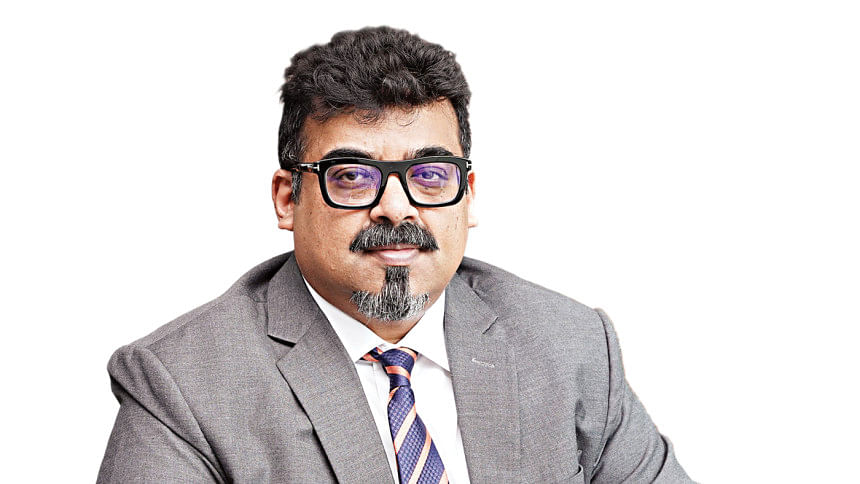Reimagining insurance through product innovation

M. Nazeem A. Choudhury
Deputy Managing Director, Prime Bank
The Daily Star (TDS): What has been your experience with bancassurance so far?
M. Nazeem A. Choudhury (MNAC): My experience with bancassurance has been both insightful and promising, though not without its challenges. Bancassurance is still at a relatively early stage, both for bancassurance and the insurance industry. Currently, our insurance penetration ratio is just 0.40%, while even our neighbouring countries have a much higher penetration ratio—Sri Lanka (2.0%), Pakistan (0.91%) and India (3.70%). So we can understand that the potential is significant in Bangladesh for insurance. With the expanding banking network and growing awareness of financial protection among customers, bancassurance can play a significant role in increasing our insurance penetration ratio.
One of the key positives has been that we have been able to provide a new offering in our existing product basket, enabling our customers to attain insurance services from our banking channel. Our clients are now realising that it is beneficial to access all financial services under one roof.
Overall, the experience so far shows strong potential for growth, and with the right investments in technology, training and customer education, bancassurance in Bangladesh can play a transformative role in increasing insurance penetration and ensuring financial inclusion across the country.
TDS: What types of insurance (e.g. life, general) are currently offered through your bancassurance partnerships? Is there a dedicated team, and how do you ensure customers clearly understand product terms and exclusions?
MNAC: Currently, only life insurance services are being offered through our bancassurance partner—National Life Insurance PLC—as that is the way to reach the majority of the population of the country. Life insurance products are sometimes too complex or not aligned with the financial profile of typical banking customers. Simpler, need-based products are required to build traction, and we are working with our partner to introduce such products in the market.
We have already introduced an affordable short-term life insurance product in the market—Prime Life. This product provides life insurance coverage for one year from as low as BDT 345. Besides, our products are tailor-built to satisfy the needs of customers, i.e. pension for old age, children's education, Hajj, and even for Den-Mohor. We offer both conventional and Takaful insurance for our customers.
In addition, we plan to offer health insurance, which is a highly need-based product designed to safeguard the health and financial security of families. Given the rising cost of healthcare and increasing awareness of medical risks, health insurance has become an essential part of financial planning.
To ensure that customers clearly understand the product terms and exclusions, we have taken several structured measures. Regulatory training is provided to our Relationship Managers, and only those who have successfully completed this training are authorised to sell insurance products.
In addition, our insurance partner conducts comprehensive, product-specific training to enhance the team's understanding and communication skills. Furthermore, representatives from the insurance partner are present during the sale process to provide support.
TDS: What is your process for handling insurance-related complaints, and how do you ensure compliance with Bangladesh Bank and IDRA guidelines?
MNAC: We follow a structured and collaborative approach to handle insurance-related complaints, ensuring full compliance with the guidelines issued by both Bangladesh Bank and the Insurance Development and Regulatory Authority (IDRA).
All complaints received at branches, call centres, or other channels are formally documented and escalated to our centralised Service Quality team. They work closely with the bancassurance team and the respective insurance partner to investigate and resolve issues within the prescribed timeframe. Customers are kept informed throughout to ensure transparency.
TDS: What is your outlook on the future of bancassurance in Bangladesh?
MNAC: The future of bancassurance in Bangladesh appears promising, given the growing banking network, increasing financial inclusion, and evolving customer needs. However, to realise its full potential, several critical areas must be addressed.
Firstly, there is a pressing need to shift towards need-based insurance products that are simple, affordable, and tailored to the financial realities of the average customer. Customised solutions—rather than one-size-fits-all offerings—will be essential in driving meaningful adoption and long-term engagement.
Secondly, regulatory and product training for bank staff must be more comprehensive. While progress has been made, there is still room for improvement in the depth and consistency of training. In addition, training centres need to be decentralised to ensure that staff in rural and semi-urban areas are equally equipped to advise and serve customers responsibly.
Lastly, increasing public awareness and trust in insurance is crucial. A coordinated effort from banks, insurers, and regulators is needed to build awareness, educate customers, and dispel longstanding misconceptions about the industry. We also need to come up with innovative insurance products to make bancassurance a success in Bangladesh.

 For all latest news, follow The Daily Star's Google News channel.
For all latest news, follow The Daily Star's Google News channel. 



Comments